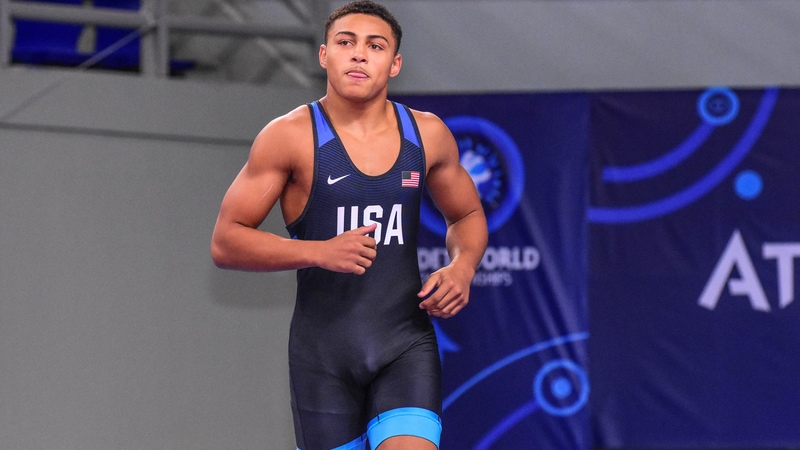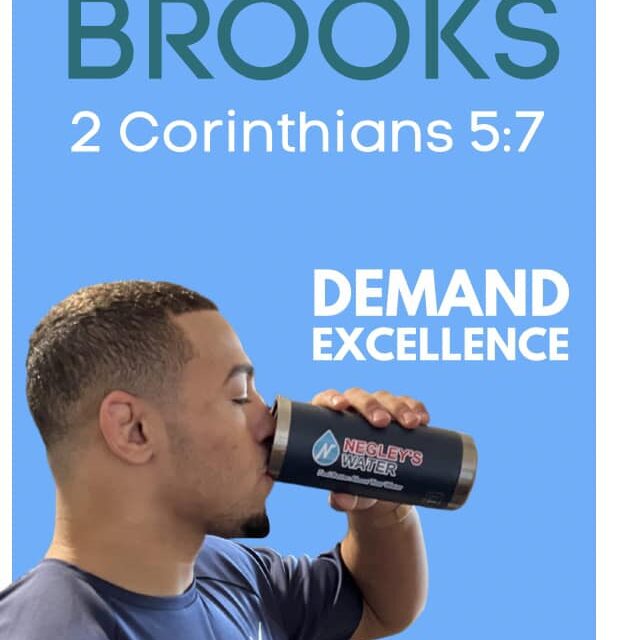
Take Down Your Thirst! #aaronbrookswater

Who is Aaron Brooks?
Aaron is a 4x Maryland wrestling state champion from North Hagerstown High School. He is regarded as one of the top wrestlers in MD history. Aaron is a two-time National Champion at Penn State. (He still has two more years of eligibility left as well.) This year he defeated Miles Amine of Michigan (twice), who was a 2021 Olympic Bronze medalist.
CAREER NOTES
Here is a snapshot of Brooks’ wrestling so far:
Collegiate: All-American as a true freshman…Was the 184-pound Big Ten Champion (2020)…Named Big Ten Freshman of the Year (2020)…Was to be the #3 seed at the 2020 NCAA Championships at 184 before the NCAA canceled the tournament… Named First Team All-American after 2020 tournament was canceled by the NCAA in reaction to a virus…2021 NCAA Champion at 184…2021 Big Ten Champion, second straight title…First-team All-Big Ten…Hodge Trophy Finalist.
Highschool / Personal: Wrestled at North Hagerstown High School…Named 2018 National High School Coaches Association Wrestler of the Year…Became seventh wrestler to capture four NHSCA Championships at NHSCA High School Nationals…Compiled a 163-2 record at NHHS…Won four Maryland state titles…Went 22-0 as a senior, 46-0 as a junior, 43-1 as a sophomore and 45-1 as a freshman…Four-year letterman, three-year captain…Has one sister, Kaiya…Has three brothers, Isaiah, Jared and Jaden…Considering a communications major.
Defeating a Olympic Bronze Medalist
Local Maryland publication, Herald Mail Media, tells an exciting recap of Brooks taking down Miles Amine who won Olympic Bronze in 2021.
“The former Hubs superstar went up 2-0 with a first-period takedown and then impressively rode Amine for the entire second period to maintain the 2-0 advantage while locking up the one-point, riding-time bonus.
Brooks extended his lead with a reversal early in the third period. Amine avoided the shutout with an escape with 1:11 remaining in the match and then scored a takedown with 8 seconds left.
But it was too little too late as Brooks became a two-time NCAA champion, while Amine — a seventh-year senior who won a bronze medal at the Tokyo Olympics last summer — had to settle for NCAA silver.
‘When it’s time to open up and do some things, I put my faith in God, and go out there and just let it rip,” Brooks said. “When you’re in alignment with God, he gives you the energy to go hard.'”
Brooks Character
There are many motivations for victory in athletics, however, Brooks’ energy comes brightly from his faith in Jesus Christ. The Daily Collegian shows us the heart of this great wrestler.
“With two weeks to prepare for the NCAA Tournament, the Nittany Lion reassessed his lifestyle to make sure he was living his life through his religion and doing the most with the talents he has been gifted.
‘He was calling me for a purpose,’ Brooks said. ‘This platform is great to wrestle on, but it’s to glorify God. This stuff comes and goes. I’m blessed with this opportunity, these gifts. They’re not mine.
‘He gives them to me to bring glory to him.'”

How the Right Hydration Makes the Difference for Aaron
Water does some things that Gatorade cannot do.
Gatorade and sports drinks are touted as indispensable in achieving top performance in athletics. The question not usually asked is when do you drink it? Most may assume that you drink it while you exercise, which would be true. However, what all constitutes exercise, playing a 90-minute soccer game or going for a brisk walk around the block? Gatorade is great, yet most will not exercise vigorously enough to benefit from it. Most non-exercisers, casual exercisers, and serious exercisers (when not in the middle of a workout) only need water for their routine hydration. What problem can drinking Gatorade produce?
Men’s Journal article “Gatorade: Don’t Drink the Gatorade” shares some insight. “‘Excess sodium intake can be a problem for individuals with, or at high risk for hypertension or kidney disease, or with diabetes,’ says Lauren Antonucci, a board-certified sports nutritionist and owner of Nutrition Energy. Antonucci works with Gatorade Sports Science Institute for athletic events like the New York City marathon to help educate athletes on best practices in sports nutrition and hydration.”
Now young athletes will likely not be at high risk for kidney disease, however, Antonucci goes on to say what is an issue for most who drink it in an unhealthy way.
“The same thing goes for Gatorade’s 21 grams of sugar per serving. Antonucci explains that for athletes, ‘we again want these individual to take in carbs (from sugar), before, during and after exercise, in order to maintain energy level, focus and reaction time.’ But, if your biggest plan for the day is a Netflix marathon, stick to water. ‘For those who are overweight and not active, they really need to reduce their overall sugar intake from all sources, including beverages,’ says Antonucci.”
Does Gatorade Hydrate Better Than Water?
Popular Science also talks about some of the issues with Gatorade in their 2021 article “Is Gatorade actually better than water?” They ask the question of whether Gatorade hydrate the body better than water. They come to an interesting conclusion which can help us think about how to better promote drinking fluids. Here is what they say:
“This myth comes from a study funded by Gatorade that found people who drank their product were better hydrated than if they drank water—but only because they drank more fluids. If you drank the same volume of water versus Gatorade, you’d be equally hydrated. This is not to say, though, that Gatorade didn’t have a point. ‘It is well documented that people drink more when the beverage tastes good!’ says Dominique Adair, a registered dietician and member of the American Council on Exercise’s Scientific Advisory Panel. ‘So just the fact that these beverages are more palatable for some people than water might encourage people to drink more.’”
They go on to reiterate what Men’s Journal said about the sugar content of sports drinks.
“That said, a 12-ounce bottle of Gatorade or Powerade contains 21 grams of sugar, which is about as much as two Reese’s Peanut Butter Cups or half a can of soda. So just keep in mind that along with that water comes a lot of sugar, which spike your blood glucose levels and can contribute to developing metabolic issues like type 2 diabetes. A typical bottle of Gatorade contains more than half of an adult’s recommended daily sugar intake.”
When Should You Drink Gatorade?
Their conclusion answers the question posed earlier, what kind of exercise merits Gatorade?
“Bottom line: If your workout lasts for more than an hour, is rigorous, and leaves you with a salty band of sweat on your face and clothes, you’d probably benefit from some kind of sports drink. If not, you probably don’t need one, though you should feel free to drink the sugar-free variety if you don’t like drinking plain water. But at the end of the day, between drinking plenty of water and eating a healthy, balanced diet, you’re probably already getting everything you need.”
Both Healthline and NBC News agree that water is the hydration choice for most people and even provide recipes for making them taste great without sugar.
Gatorade is great when used at the right time with the right person. Water is better for the regular hydration that everyone needs each day. Aaron is certainly the kind of athlete that can use Gatorade and when he is not exercising rigorously he drinks high-quality H2O.


Why Pure Water Performs Better than “Regular” Water
Seeing that water is the best source of hydration for most occasions and most people. Does it matter if the water is pure? NPR speaks to this by addressing the question of whether minerals found in hard water, calcium and magnesium, can add to the daily mineral intake requirement for a healthy diet.
“But what about adding minerals like calcium, potassium and magnesium to the water, like the filter from the video? If you’re trying to replace all of the minerals from a healthy diet with mineralized water, Heil says it’s probably just not going to happen. He says you’d have to drink gallons upon gallons of mineralized water before any health benefits are realized.”
The fact is that food is the only real source of minerals and nutrients that we need. Your water should provide the H2O your body needs, but just that. Pure water is water that is just H2O and nothing else. The best way to make it is by Reverse Osmosis which many bottled water companies like Aquafina use to give you the bottled water you trust and love. What you may not know is that you can have this water in your own home and a fraction of the cost of bottled water.
City Water is Not Pure Water
Many homeowners who live in the city borough limits believe that they have good water or clean water. Is this the case really? The answer from a growing number of research papers is that though they have bacteria-free water, they are not free from other harmful contaminants, especially emerging Chlorine by-products which are not currently regulated by the EPA.
Chlorine is an amazing killer of bacteria and is the cause of much progress in health in the U.S. That said, once it does its job and preserves your water bacteria-free all the way to your house, it no longer needs to be in your home or your body. It is like eating the banana peel along with the banana. Only monkeys do that!
One research paper speaks of the effect of Disinfection-by-products (DBP) on rats. “Chlorination is the most popular method for disinfecting swimming pool water; however, although pathogens are being killed, many toxic compounds, called disinfection by-products (DBPs), are formed… In this study, we show that although the growth and behaviors of experimental rats were not affected, their health, training effects and metabolic profiles were significantly affected by a 12-week swimming training program in chlorinated water identical to that of public pools. Interestingly, the eyes and skin are the organs that are more directly affected than the lungs by the irritants in chlorinated water; instead of chlorination, training intensity, training frequency and choking on water may be the primary factors for lung damage induced by swimming. Among the five major organs (the heart, liver, spleen, lungs and kidneys), the liver is the most likely target of DBPs.”
A USA Today article shares how some disinfection by-products are currently regulated yet there remain others that are not. They even mention how countries like Germany and the Netherlands have eliminated Chlorine as a means to purify their water due to these issues.
“When chlorine is combined with phenols, which are chemicals that are both naturally occurring in water and exist in pharmaceuticals and personal care products, the mixture produces disinfection byproducts.”
“This includes two forms of the toxic compound and known carcinogen BDA, which haven’t been discovered in drinking water until this study.”
“Yip explained that BDA molecules are so small and lightweight that they tend to be hard to differentiate from other molecules present in water.”
How Much Chlorine is Okay?
Free Drinking Water’s water education shares that your swimming pool should contain no more than 1.0 to 3.0 parts per million (ppm) of chlorine. This is the same as the chlorine limits for the city water entering your home. If you wouldn’t drink your pool water, why would you drink or cook with your tap water? This is the very reason why we have water softeners designed for city water applications that have carbon which removes the chlorine from the water.
Two other research papers cover the connection between chlorine and breast cancer. One showed a “slight, but significant risk associated with surface chlorinated water” and the other discovered an “increase in mammy lesions” in rats exposed to bromodichloroacetic acid (BDCA) a disinfection by-product in drinking water.
Pure Water is the Only Option for Athletes
For peak performance, athletes need to have the right hydration and food which will help them build the strength to out-compete their opponents. Buy a filter or be a filter. If water is not pure, your body will make it pure before it uses the H2O. All the non-H2O will either be removed through the renal system or it will stay in the body. Peak performance demands pure water.

Why Soft Water and Reverse Osmosis Water is Aaron’s Go-to Over Bottled Water
Bottled water is not sustainable.
Although this water is often pure, especially those bottled water companies which use reverse osmosis, it is inherently exposed to plastic. Plastic bottles contain contaminants like PFOS and PFAS, called forever chemicals due to the fact that they remain in your body forever. Water is a universal solvent which means that given enough time, it will dissolve most everything it contacts including the plastic of the bottle that contains it.
On top of this, empty plastic bottles often go to the trash which ends up in landfills and remain there for upwards of 500 years. Going green is often at the expense of convenience and lower costs. However, bottled water is only more convenient if you don’t plan ahead and it is truly more expensive than if you purified water in your home. Reverse Osmosis (R.O.) water costs Cents on the dollar for every gallon compared to bottled water.
Soft Water and R.O. Water is the Long Term Solution
The same healthy water that you buy at the convenience store is available in your home. However, buying bottled water for health reasons is not a long-term solution. NPR reports on the perceived healthy choice of bottled water, saying “People also tend to like the idea of a quick and easy way to take the ‘healthy’ route, says Heil, and buying a bottle of water with minerals in it is easier than uprooting a diet to make it more nutritious.” The fact is that water cannot possibly replace food nor truly supplement it by giving the body the minerals and nutrients that it needs on a daily basis.
If hydration is going to be a daily habit, it must be sustainable both in the financial cost and the time cost. Lugging 24 packs of bottled water is not what anybody wants to do, so don’t do it. Drink a glass of water from your own tap in the morning, and fill up your thermo-insulated water bottle to drink water throughout the day. Come home and have a glass of it with dinner and one two hours before bed. Doing this with pure water from your own home is a solution worth doing everyday.


Why Soft Water and R.O. Water is Worth the Price
Better water requires less time for cleaning your home and less time heating up.
Time is money. How much time do you want to spend cleaning the tub each week and how much time do you want to wait for the water to heat up? Soft water not only takes less time to heat up, but it also produces far superior soapy suds with 1/7 the amount of soap. See this in action in our video on water hardness. This translates to using less elbow grease, less time, and less money to do your routine cleaning. Water heaters take more energy to heat up hard water. The calcium and magnesium build up in the water heater, decreasing its life. Soft water and R.O. water help you spend less money on energy bills, household cleaners, and Bengay.
Buy a Filter or Be a Filter.
As was said earlier, either your filter will clean the water or your body will. Buying a filter is a small price compared to the cost of long-term health issues. You spend a lot of money on health insurance, so why not spend a little more to ensure the health of your body? You only get one, treat it right with R.O. water.
Better-tasting water will help you drink more of it
Improving your health starts with the basics: better eating habits, better hydration habits, and better sleeping habits. Changing old habits is not easy and many try unsuccessfully. Again from Popular Science, “’It is well documented that people drink more when the beverage tastes good!’ says Dominique Adair, a registered dietician and member of the American Council on Exercise’s Scientific Advisory Panel.” The common complaint of those who do not drink much water is that they do not like the taste of it. Do what you need to do to care for your body and your family’s health. Soft water and R.O. water taste better and will help you drink more of it to meet your daily hydration needs. Consider getting this better water as a down payment on your health journey.